Mar 11, 2014
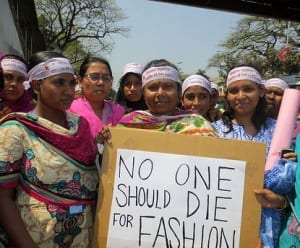
In Bangladesh, BCWS Executive Director Kalpona Akter rallied with garment workers on International Women Day. Credit: Solidarity Center
Hundreds of workers from multiple garment factories rallied in recent days at the National Press Club in Dhaka, Bangladesh, where they formed a human chain and demanded equal wages, equal rights and equal dignity for woman workers in the ready-made-garment (RMG) sector. The action was among many around the world throughout the past week as women workers and their allies commemorated International Women’s Day, held annually on March 8.
In Chittagong, where workers from 16 garment factories marched and rallied, Bangladesh Independent Garment Union Federation (BIGUF) Chittagong President Nomita pointed out that nearly all who took part were women.
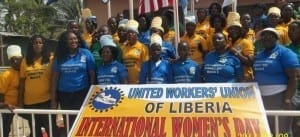
Liberian trade unionists celebrate International Women’s Day 2014. Credit: Solidarity Center
“I can’t imagine trade unions without women,” she said. Nomita urged RMG factory owners to fully implement maternity leave and establish child care centers in factories. In addition to BIGUF, other Solidarity Center allies taking part in International Women’s Day actions in the country included the Bangladesh Center for Worker Solidarity (BCWS), the Bangladesh National Garments Workers Employees League (BNGWEL), the National Garment Workers Federation (NGWF) and Sommilito Garments Sramik Federation (SGSF).
Elsewhere around the world, Solidarity Center allies marked International Women’s Day by celebrating, educating and mobilizing.
• In Tunisia, the Union Générale Tunisienne du Travail (UGTT) held a solidarity march for Palestinian women and repressed women around the world. The March 8 event took place on the main avenue in Tunis, the capital, and concluded at the UGTT center with music, cultural activities, poetry and an exhibit on the history of women’s activism in Tunisia. The event followed a roundtable on a comparative study of women’s rights in the country’s three constitutions.
• Moroccan union activists and members of the Confederation Democratique du Travail (Democratic Labor Confederation, CDT), took part in trainings that covered women’s legal rights and they also held artistic and cultural events, concluding with a ceremony honoring social activists and retired women. The Union Marocaine du Travail (Moroccan Workers’ Union, UMT) combined a celebration of Women’s Day with events marking the 59th anniversary of its founding congress. Later this month, UMT will host a roundtable discussion on the role of women in the union and strategies for broadening women’s participation in the union.
• The Border Committee of Women Workers (Comité Fronterizo de Obreras, CFO) held a mini-workshop for women participating in the Solidarity Center’s Gender and Women’s Empowerment for Action program in Coahuila, Mexico. The discussion focused on how International Women’s Day is more than a time for women to receive feel-good gestures like a flower or nice words on Facebook from the men in their lives. In Mexico, where women disproportionately bear the brunt of the country’s economic and social insecurity and violence, Women’s Day offers a space for women and girls to evaluate how far they’ve come and how much further they still must go to win equality with men and boys and achieve justice in all areas of their lives.
In Liberia, women and their allies held a parade to the United Workers Union of Liberia (UWUL) office, where they raised flags in recognition of labor partner organizations such as the United Steelworkers and IndustriAll that implement programs to help female unionists to become a strong force in Liberia.
• Across South Africa, the Solidarity Center joined with Labour for Rights for Women (LRW) campaign and the Labour Research Service (LRS) to host two events. In North West Province, the organizations convened health care workers, farm workers and domestic workers in a meeting with local civil society organizations and the South African Department of Health to discuss the impact of a new government health insurance plan, especially its impact on women workers. In Limpopo Province, the LRW held a training session for union gender coordinators, organizers and negotiators on maternity protection. The LRW, sponsored by the International Trade Union Confederation (ITUC), brings together South Africa’s labor federations to support improved respect for women’s rights at the workplace and their greater participation in union activities
Mar 5, 2014
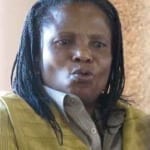
Phumzile Mashishi, HOSPERSA gender project officer, helped lead the gender action learning process in her union.
Each day this week, leading up to International Women’s Day March 8, the Solidarity Center is highlighting an example of how women and their unions are taking action to improve women’s lives on the job, in their unions and in their communities.
Unions around the world are at the forefront of the struggle for gender equality. And sometimes, that means taking a look at their own structures, policies and practices to ensure they, too, are working to make equal treatment and non-discrimination central to their efforts.
In South Africa, four unions grappling with the complexities of gender inequality took part in a structured, multiyear process facilitated by the South Africa Gender Action Learning Program. The group is part of Gender at Work, a global nongovernmental organization that helps organizations become models for a more equitable and accountable world.
The unions—which represent building and construction workers, health care and retail workers and farm workers—recognized that male-dominated, hierarchical, union culture does not easily address issues such as sexual harassment and violence against women within the union, and they sought to develop alternative models of power. The process involves feminist popular education, interactive learning and a lot of work “at the consciousness-raising level,” said Nina Benjamin, who led the project which, for one union, began in 2005. Benjamin is gender research program coordinator for Labour Research Service/Gender at Work, South Africa.
A recent Solidarity Center-sponsored report, “Bringing Back the Heart,” explores the Gender at Work process with these unions and details how the partnerships achieved tangible results:
• Increasing numbers of women joined the unions,
• More women ran for union leadership positions,
• Union leadership gained a deeper understanding of worker concerns and became more accountable in addressing them, and
• Union activists reported that the process reinvigorated and re-inspired them, even in the face of widescale workplace restructuring and deteriorating working conditions.
The process ensured that gender work was not relegated to the status of an “add on.” Leaders developed unionwide strategies for achieving gender equality—and made notable progress.
• The South African Commercial Catering and Allied Workers Union (SACCAWU), which organizes workers in the hospitality, catering, retail, service, tourism and finance sectors, includes a majority of women as members—but few had been union leaders. Following its partnership with Gender at Work, women routinely ran for and were elected into key leadership positions at the worksite level.
• The autonomous, women-led trade union, Sikhula Sonke, reported that membership was growing, domestic violence was decreasing and union leaders were tackling broader discrimination issues (such as xenophobia, homophobia and HIV). The union, which organizes those who live and work on fruit and wine farms, also found farmworkers’ daily lives were improving and they were gaining access to new resources.
• The predominantly male construction union, the Building, Construction and Allied Workers Union (BCAWU) engaged key male leaders in the Gender at Work process, with the result that more women have joined the union, and they now increasingly participate in the union, such as by becoming shop stewards.
• Health and Other Service Personnel Trade Union of South Africa (HOSPERSA), which represents public and private health-care workers, primarily nurses, expanded its reach to grassroots members. Together with union leaders, they are building a new culture of unionism—broadening campaigns from a focus on wages to include issues central to the lives and work of its predominantly female membership.
These four unions demonstrate the challenges of organizational change, but their experiences also show that even in unions with diverse memberships and experiences, a focus on gender equality can empower women and return the balance of power back to members.
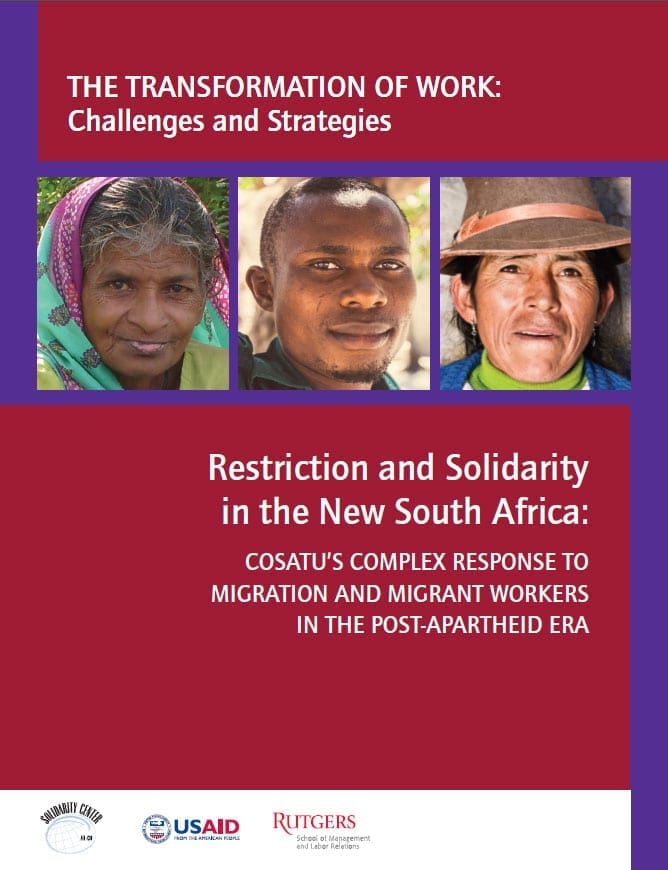
Jan 9, 2014
This report look at South African labor’s complicated engagement with migrant workers by examining the migration policy debate, labor’s response to the xenophobic attacks of 2008 and two organizing campaign in the agricultural sector. It sheds light on how labor migration and hostility toward immigrants are intertwined with the state’s embrace of neo-liberal economic policy and with growing labor precariousness.
Download here.
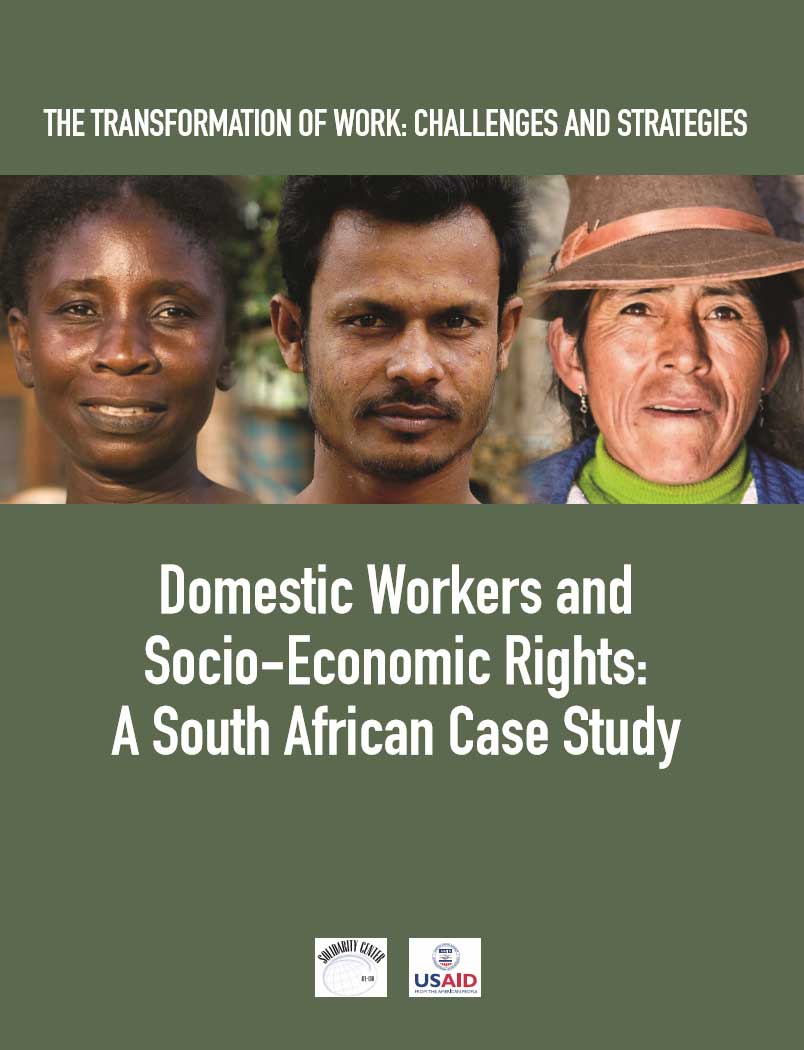
Dec 24, 2013
This report explores the challenges of empowering domestic workers in South Africa through the traditional trade union focus on worker rights, democratic voice and collective action. This Solidarity Center report is part of a multiyear research project, funded by the U.S. Agency for International Development, to study the informal economy, migration, gender and rule of law together with research partners Rutgers and WIEGO.
Download report.
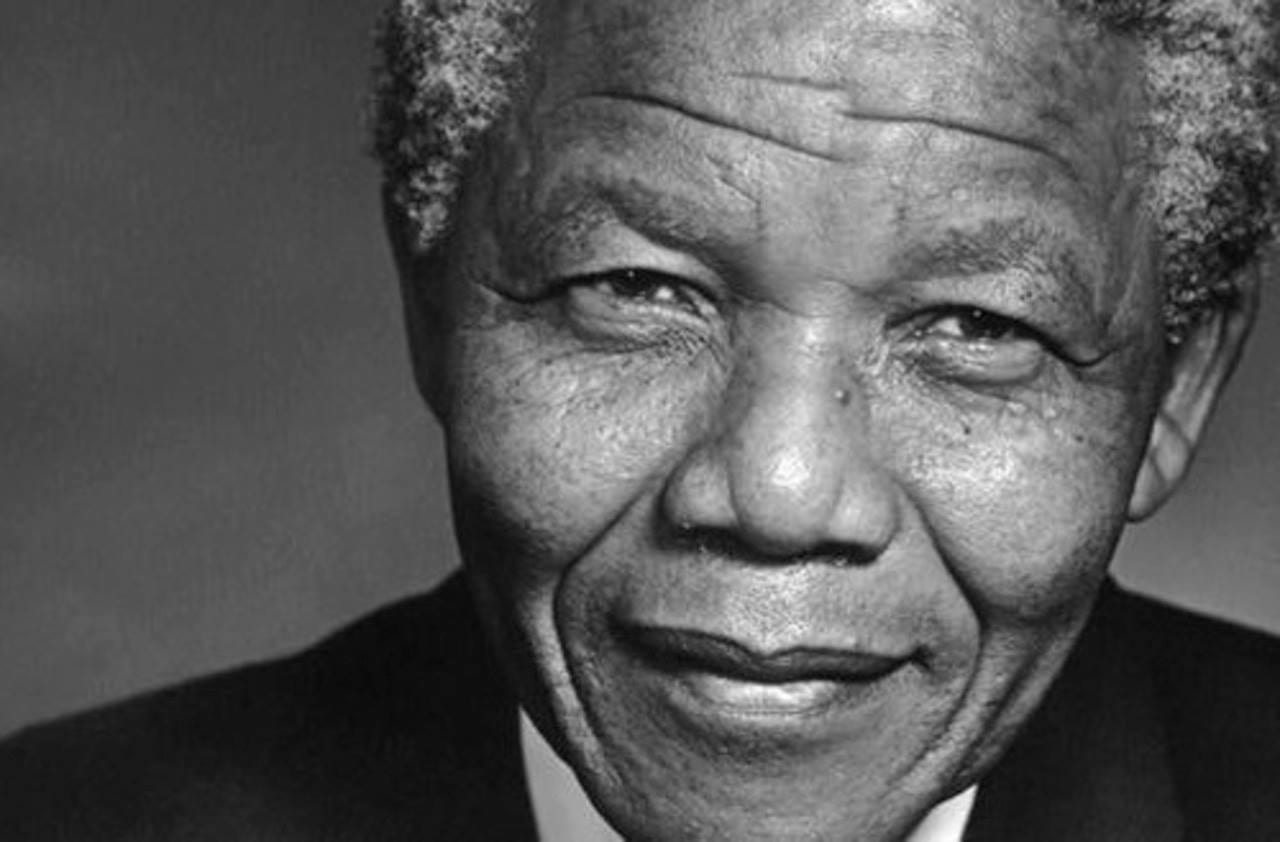
Dec 6, 2013
Stanislaw Cieniuch, former Ambassador of the Republic of Poland to South Africa (1991-1997), recalls his firsthand experiences with anti-apartheid activist Nelson Mandela under South Africa’s apartheid regime. Cieniuch is Solidarity Center Kyrgystan Country Director.
I have been the fortunate witness and participant in two of last century’s historic democratic transitions, first in Poland and then in South Africa. And today, as we mourn the loss of Nelson Mandela, I am reminded of his extraordinary character and his impact on history—and marvel that I had the opportunity to get to know this dedicated and compassionate man.
In June 1981, I was a member of the Polish delegation at the International Labor Organization (ILO) conference in Geneva. Our worker’s group was headed by Lech Walesa, and we were still enjoying a carnival of freedom and solidarnosc at home. It was then that I was nominated as a member of the ILO’s Anti-Apartheid Committee and my involvement with South Africa began.
Ten years later (after the democratic changes in Poland), I was named Ambassador to South Africa, representing our new Poland in a country going through its own rebirth.
Given the pace of change that took place in the six years spanning my diplomatic mission, I essentially served in two nations. I arrived in a country with apartheid laws. But groundbreaking decisions were beginning to change the landscape. Nelson Mandela was free, and African National Congress (ANC) activists were returning from exile or from underground.
My position—as ambassador for a country that had recently gone through its own liberation struggle—allowed me the opportunity to be present at many critical and dramatic moments that led to the end of apartheid, first free elections and then the inauguration of the world’s most famous political prisoner as president of the country.
In every meeting with Nelson Mandela, in offices and private residences, I was always impressed not only by him and his legend, but also by the warmth of his personality, fine sense of humor and serious dedication to his cause. And it was clear to me that perhaps his greatest contribution to South African history was his commitment to inclusiveness. He said:
“I have fought against white domination, and I have fought against black domination. I have cherished the ideal of a democratic and free society in which all persons live together in harmony and with equal opportunities. It is an ideal which I hope to live for and to achieve. But if needs be, it is an ideal for which I am prepared to die.”
During those decisive years, on a sunny Saturday morning before Easter in 1993, Chris Hani, Communist Party leader and chief of staff of Umkhonto we Sizwe the ANC’s armed wing, was assassinated. The murder of one of the ANC’s most charismatic leaders and hero to radical youth brought the country to the brink of civil war. Poland, and me as its representative in the country, were swept up in the aftermath when it was discovered that Hani’s assassin was a Polish immigrant, Janusz Walus, who had conspired with Clive Derby-Lewis, a senior Conservative Party Member of Parliament (MP).
South Africa held its breath, terrified of the angry explosion that might follow. Nelson Mandela immediately addressed the nation and appealed for calm: “Tonight I am reaching out to every single South African, black and white, from the very depths of my being. A white man, full of prejudice and hate, came to our country and committed a deed so foul that our whole nation now teeters on the brink of disaster. A white women, of Afrikaner origin, risked her life so that we may know, and bring to justice, this assassin. The cold-blooded murder of Chris Hani has sent shock waves throughout the country and the world. … Now is the time for all South Africans to stand together against those who, from any quarter, wish to destroy what Chris Hani gave his life for—the freedom of all of us.”
The shame of having my countryman so violently intervene in the course of South Africa’s history weighed heavily on me. My respect for Mandela only grew with his effort to calm the nation and his reassurance to me that my country and people were not to blame.
Later, after the elections in 1994 the new South African leaders invited me to participate in their efforts to reconstruct the country. For example, I took an active part in discussions to design and launch in 1995 the National Economic Development and Labor Council (NEDLAC). This institution proved to be successful in bringing together government, business, labor and community interests to reach consensus through negotiations on all labor legislation and all significant social and economic legislation. I had many conversations with Nelson Mandela about the council’s formation, and he took great personal interest and involvement in the establishment of the NEDLAC.
I was a privileged witness of the events of one of the greatest sagas of contemporary history. That mission did not end on the day apartheid ceased. Mandela dedicated his life to completing the unfinished work of liberation— psychological, economic and social emancipation. Through his leadership, wisdom and generosity, he launched a real movement for reconciliation in a deeply divided society.
Nelson Mandela will always remain a great historical figure for his decisive contribution to the victorious anti-apartheid struggle and peaceful, miraculous transition in South Africa. I grieve his death and am humbled for having worked with him.







